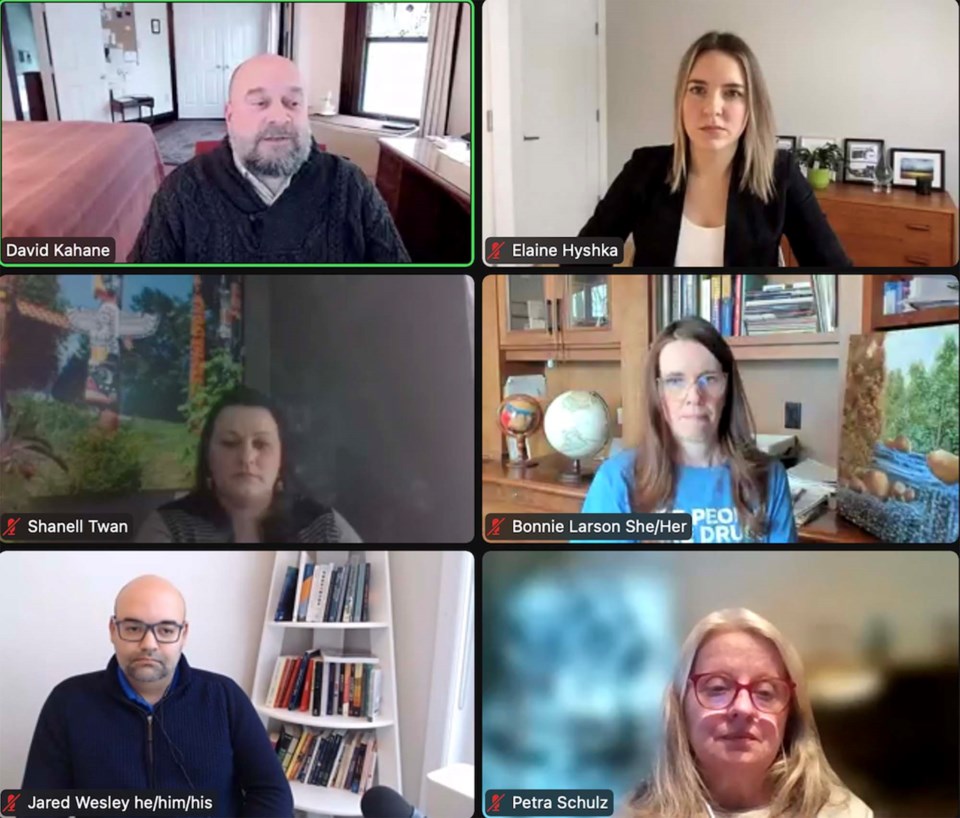Last year was the deadliest year on record in Alberta for fatal drug poisonings and experts say changes in public policies could save lives.
On Friday the University of Alberta hosted a round-table talk on the politics of the drug poisoning crisis in Alberta, where five panellists talked about the more than 1,300 deaths in the province in 2021 — an average of four or five deaths per day.
Since 2016 some 23,000 Canadians have lost their lives to apparent opioid toxicity, said Elaine Hyshka, an assistant professor of health policy and management in the University of Alberta's School of Public Health, and Alberta has been hit particularly hard, with the highest death rate in the country since the crisis began.
“I think it's really important to note that First Nations people in Alberta are far, far more likely to die of opioid poisoning than members of the general population,” Hyshka said.
In 2020, the death rate for First Nations people with opioid poisoning is 111.9 per 100,000, compared to 15.3 for non-First Nations people in Alberta.
Hyshka said the crisis started in 2014, but the policies that followed to crack down on prescribing and dispensing pharmaceutical opioids may have led to more potent drugs in communities. The provincial government has focused on enforcement, which Hyshka said is not particularly useful in tackling drug poisoning
“There is a theory and some evidence to support the idea that, as we escalate our efforts to crack down on the illegal drug supply, the illegal drug supply actually gets more toxic in response,” Hyshka said.
Traffickers will start to bring in stronger and more potent substances, which are more difficult to consume in a safe way. Hyshka said there is a higher return on investment with these drugs.
Policies to tackle the opioid epidemic have also focused on abstinence-based treatment programs, which can be beneficial for people using alcohol and stimulants, but are not recommended as a first option for opioid-use disorder.
To tackle the accidental opioid poisoning deaths, the province needs to focus on things like education, treatment, and ensuring there are naloxone kits available to help people who may need it.
“A further promising strategy is to help reduce the risk of poisoning by replacing the toxic drug supply with pharmaceutical alternatives of known potency and quantity,” Hyshka said.
Doctors like Bonnie Larson, who is a clinical assistant professor in the department of family medicine at the Cumming School of Medicine in Calgary, are qualified to work with patients to make sure they are getting the right amount of the drugs they need.
“We need to be very careful about prescribing and tapering. It has to be done extremely carefully, very slowly, and in partnership with patients and doctors who are able to do all of those things,” Larson said.
While the crisis has ravaged the country since 2014, Jared Wesley, an associate professor of political science at the University of Alberta, said Alberta Premier Jason Kenney has only tweeted the word “opioid” eight times since he took office, compared to the words “oil and gas,” which he tweeted has 249 times.
“We know that this government's priorities lie in economic development, particularly oil and gas sector, but it does demonstrate the extent to which this government has not prioritized the crisis that we're talking about today,” Wesley said.
Since the pandemic started, Wesley said the provincial government has been linking the opioid crisis to the pandemic, suggesting that lockdown measures have pushed people to overuse, and that opioid deaths have increased because of a lack of available services, or opioid use is going up because of the increase in federal relief funds.
Wesley said the UCP government has also emphasized, at different points, the importance of ensuring small businesses don’t have supervised consumption sites or harm-reduction facilities in their neighbourhoods, because it cuts down on business.
The political science expert said the UCP is not trusted on the issue of public health, and as a result they will want to de-emphasize the issue or link it to another issue the public trusts them with, such as the economy and public safety.




